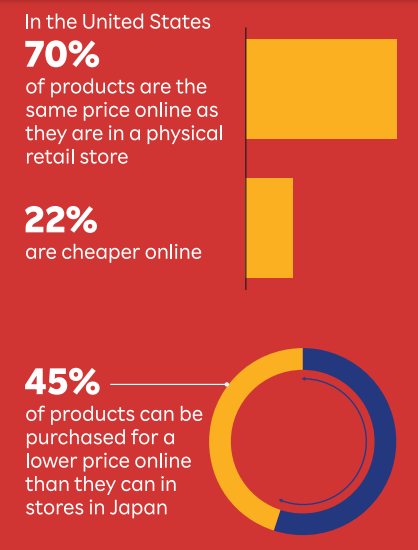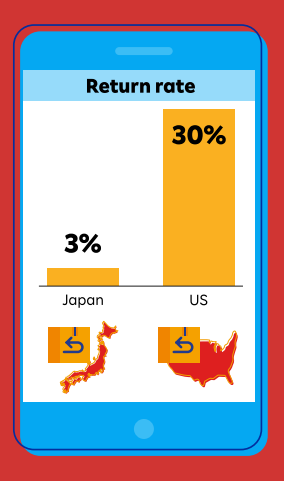Customer Expectations and Behavior in Japan

One of the largest differences in Japanese shoppers and an existing American customer base is culture, which can often pose challenges to breaking into the market. One of the best things that a business can do to help bridge that cultural gap is to understand what Japanese customers will expect when choosing an American made product.
Customers expect lower prices online
One of the biggest reasons that Japanese consumers like to buy internationally is that foreign brands often offer better prices. While it is true that there are multiple contributing factors in product selection and brand loyalty that are more important than price, offering competitive pricing is a must.
The most popular and promising categories in Japanese eCommerce are the following:
Fashion & athleisure
Beauty & cosmetics
Supplements
Sports & outdoor
Electronics
It is also expected that products will be available cheaper online. This is especially important for resellers of national branded items who will be competing with a variety of other sellers.

In the United States, about 70% of products are the same price online as they are in a physical retail store and only 22% are cheaper online. However, 45% of products can be purchased for a lower price online than they can in stores in Japan. Several factors contribute to this.
In Japan, cities tend to be densely packed, with different stores located close together. This is extremely convenient for consumers and can be more favorable than waiting for something to ship. This means that a lot of online retailers in Japan must keep their prices low to incentivize online shopping.
Japanese consumers are also more likely to use price comparison tools than their American counterparts, which forces Japanese products to be priced competitively online.
Japanese consumers look for things like product quality, product features, and overall value of a product more than they look for low prices; however, it is important to remember that they are used to things being more affordable online as well as when purchased from an international brand. Knowing this can help companies price their products effectively.
Customers expect fast, flexible shipping
Japan is a very small country, geographically speaking. This means that most retailers can offer same-day and next-day deliveries. Japanese consumers are used to fast shipping but there is a lot of evidence to demonstrate that they are willing to wait for international shipping as long as the products meet their expectations.
This is further accentuated when they approve of a brand and when they have a positive online shopping experience.

Although fast shipping is a critical factor in Japanese customers’ purchase decisions, the most important thing is that shipping is flexible. Most Japanese consumers are used to being able to customize their delivery dates and times so this is something that they have come to expect, no matter where they’re shopping from.
Sellers must ensure they have a range of flexible shipping options that will allow shoppers to customize when their products will arrive. This will help them make sure that they’re home to receive their deliveries or they can get it faster if they need it sooner.
Fortunately, this is something businesses can handle regardless of the shipping location, whether that is domestically in Japan through a warehouse or globally from a stateside warehouse.
Providing a range of shipping options is easy on a platform like Rakuten, which has a range of options built right in. This high rate of customizability is a perfect way to meet customer expectations and prove you are dedicated to providing your products at their convenience.
Customers expect transparency
In 2020, Edelman Trust Barometer Japan Results shows that Japan ranked in the 7th lowest among 26 countries when it comes to trusting businesses. This means that Japanese customers do not take marketing messages at face value and that they may be skeptical in their purchase decisions.
This isn’t an impossible hurdle to overcome, but a business must show that they are dedicated to the transparency that these consumers demand from international brands. One of the primary ways that you can do this is by selling through a trusted marketplace like Rakuten.

One of the persisting trends among Japanese consumers is that user reviews are more important than any expert insight. A great way to help build trust among your brand is to make sure that customer reviews are accessible and that they’re properly translated so that other Japanese shoppers can read them when making their selections.
Ranking lists of products can help showcase what others have previously purchased. Japan is typically not as individualistic as America so these shoppers will be interested in what products their peers have purchased and what they’ve had to say about them.
Research has also shown that Japanese consumers want to know how to return a product. Return rates are astoundingly low compared to the US; those rates are just 3% in Japan as opposed to up to 30% in America.
However, most brands in Japan don’t offer as much transparency in this area compared to American brands. Make sure to include this information in an easily-accessible way as well.
Related post: Taxes, Laws and Regulations for eCommerce Businesses in Japan
Customers expect detailed information
Assurance is something that Japanese consumers demand when it comes to shopping online. Japanese customers diligently research before making a purchase. Because of that, having detailed information about your brand and your products is going to be critical to your success.
You can expect a Japanese consumer to research your brand or shop directly before making a purchase. You can use this to your advantage by including detailed product description in your listings.

Price and convenience are not the sole motivators for shopping online in Japan, so these shoppers are going to have great attention to detail. Therefore, it is important that you provide details that fully explain your product offerings.
Your product listings should include robust product descriptions, list features, purchase options, dimensions, product reviews, and more. The more information provided, the better.
Japanese people are very careful shoppers, especially in comparison to consumers in other parts of the world. One way to ensure that as much information as possible in the product description is to use an online marketplace.
A platform like Rakuten allows you to do custom product pages that appeal to targeted customers. Ensure everything is appropriately translated also helps to remove any potential stumbling blocks on the shoppers’ path from consideration to the final purchase.
Customers expect to be rewarded for their loyalty
Japanese consumers have a history of fierce brand loyalty when they find a product that meets their expectations. Japanese consumers expect to be rewarded for their loyalty and taking this into account can help you drive your success in the long run.
Almost half of all Japanese consumers choose to buy from a specific website based on the presence of a rewards system. According to this particular survey, this was the most significant factor for shoppers, right behind the variety of products available.

Most rewards structures are based on a points system that allows shoppers to earn points towards discounts with every purchase. This practice is successful because it draws in customers and incentivizes them to keep coming back.
This builds on the brand loyalty you are working to build with customers. This is another place where Rakuten shines. Rakuten has a built-in system that can link directly to shoppers’ credit cards that you could choose to take advantage of as a seller on the platform. This point system is one of the contributing factors to Rakuten’s widespread success in Japan.
Some type of rewards system has been in place on Rakuten since as far back as 1998; however, the current iteration has been around since 2002. It is called Rakuten Points and it is a massive reason that so many consumers have remained on the platform.
Rakuten Points offers buyers an extra motivational boost to shop on the platform, and sellers have the opportunity to help provide extra incentives for buying their products.
